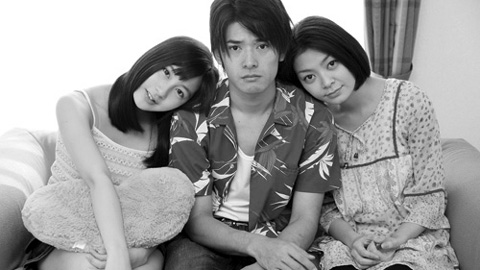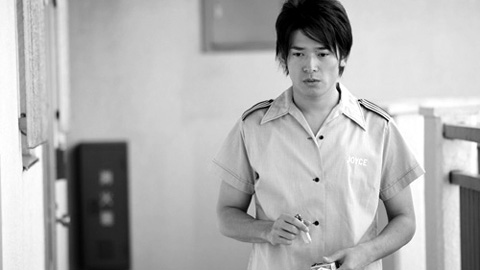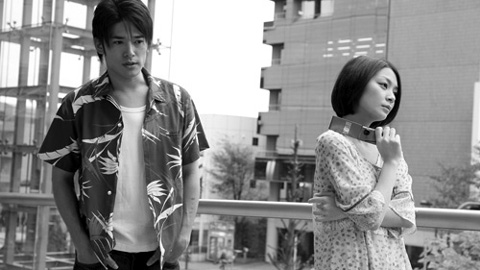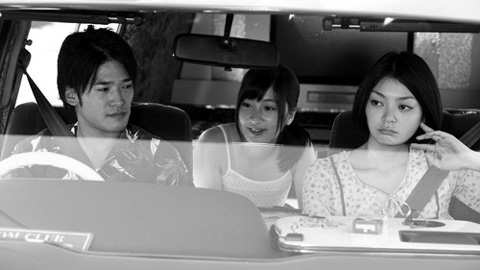Triangle
- Year
- 2010
- Original title
- Sankaku
- Japanese title
- さんかく
- Director
- Cast
- Running time
- 98 minutes
- Published
- 3 September 2012





by Bryan Hartzheim
Keisuke Yoshida’s romantic comedy Triangle is one of the most overlooked gems from 2010. Distributor Nikkatsu dropped the ball on promoting the film properly or getting Triangle into any major festivals, apparently not sensing they had a winner on their hands every bit as poignant and true-to-life on contemporary "relationships" as Hitoshi Yazaki’s Sweet Little Lies and Kota Yoshida’s Yuriko’s Aroma, but a hell of a lot funnier.
Triangle’s chief virtues lie in the strength of its screenplay, the wonderful comic timing of its performances, and its no-frills direction that casually captures a chain of events resulting from the intrusion of a third wheel in a monogamous relationship. Perhaps this lack of directorial flourishes is another reason why Yoshida (who wrote and directed the film) doesn’t receive the attention he deserves, as his camera setups are refreshingly simple and classical. In fact, Yoshida has created the sort of film that evokes the work of American writer-director Alexander Payne: incredibly detailed characters; frequently biting but also honest dialogues; lived-in, revealing mise-en-scene; all wrapped up in a tight, three-act structure and a straightforward visual style. More concretely, Yoshida’s third film signals (along with his underrated Café Isobe / Junkissa Isobe) an appetite for the casually pathetic and an ear for the absurd that is both bawdily funny and painfully real.
The film’s titular triangle is between Momose, a nearly 30-year-old man-child working in a fishing tackle shop; Kayo, his slender, live-in girlfriend; and Momo, her 15-year-old sister who is visiting them for several weeks in Tokyo during the summer. We waste no time getting to know the bedraggled couple. Momose has apparently been lugged to a coffee shop by Kayo to talk about a pyramid scheme with her friend. Upon leaving, he makes clear his disdain for her sense of judgment, she her disappointment in his lack of etiquette. He drives her home in a van, which, with spoilers and tailfins, has been made to look like a bloated jet, complete with his own likeness painted on the rear windshield. Her apartment is cute and cozy and has his single, giant flatscreen TV in the living room. They sleep on futons beside each other while her grinding teeth wake him up at night. Repeatedly and efficiently, we see the awkward, slightly forced compromises of their deteriorating relationship.
Momo’s arrival begins the process of dividing the quarreling lovers. Her bubbly, ADHD adolescent personality and perky, developing body (that the film makes a point to repeatedly showcase in scant clothing) irritate her sister but very quickly begin to charm the pants off Momose. While Kayo heads out to work, the two begin a grade-school affair of increasingly sexual gestures: a compliment, a sniff of hair, a whisper into the ear, brushing fingertips, a pseudo-foot massage, all behind the back of a slightly suspicious Kayo. What compounds the humor in these little encounters is the fact that they nearly all take place in the cramped confines of the couple’s 1LDK, a large enough space for a single bachelor that turns claustrophobic with a family of three. Yoshida and his DP do a nice job of getting the cozy nature of this space. A clandestine conversation or elicit indiscretion in one room means that someone is talking on the phone or sleeping or taking a shower in the other. Uncomfortable, cringe-comedy at its finest.
Triangle makes clear that a man’s fidelity is only as true as his options, and a rejuvenated Momose – presented with a younger version of his girlfriend who complements his souped-up van, tells him he’s cool, and walks around his apartment half-naked – hungrily decides he’d like to swap sisters (it’s no coincidence that both are named Momo, as he’s really just a big irresponsible kid, with the same adolescent hobbies, after all). While the film doesn’t delve too deeply into Japanese pop culture’s obsession with increasingly adolescent sexuality, it does give a few reasons for why Momo would be infatuated with a sorry older fellow like Momose, whose irrational confidence and cocky demeanor comprise a thin surface layer that most teenage girls are content not to dig beneath.
When Momo must return to her hometown, the film’s second act conversely details how Momose and Kayo drift apart in a series of trivial, hilarious arguments. One scene where Kayo asks Momose to kiss her, only to complain afterwards that there wasn’t enough "love", is both hilarious in its comic timing but also surprisingly accurate ("It’s in his kiss", as Aretha Franklin would say). After enough arguments, Kayo initiates a breakup, and Momose all too willingly accepts, much to her dismay. At this point, the film takes an agonizing turn in detailing a messy, drawn-out breakup. Simply put, these scenes will be difficult to stomach if you are recently suffering from the pangs of separation; pleading, begging, and various forms of supplication here are contrasted with cruel, almost repulsed indifference. Let’s face it: we’ve all been there, either on the giving or receiving end. But Triangle is especially unflinching in showing how cold humans can be to one another when the last trace of affection disappears.
Despite these soap-operatic turns in the plot, Triangle never indulges in bad taste. Sometimes, the strength of a good Japanese film is made apparent by imagining its story remade by a TV studio. No doubt such a studio would have found it very easy to make Momose into a dumb and simple cad, while his "girlfriends", ever more wizened and empowered, decide to run circles around him and concoct a clever, comical revenge scheme that piles up the implausibilities. But Yoshida’s script never betrays its three central characters, gradually revealing facets of their personalities through the impulsive decisions they make and the comic consequences of their actions. The relationship between Kayo and her little sister will ring true to anyone with a sibling – lots of pointed jabs at one another, both of the physical and emotional variety, and nary a sentimental expression of appreciation or affection. Momose is a selfish brute, but one also capable of guilt and even occasional self-reflection, however self-serving. While he might be the biggest and most obvious swine, Kayo is also revealed to be pathetic in equal measure for her emotional dependence. She hasn’t conceived of a life for herself outside of pleasing her boyfriend, and her attempts at reconciliation begin comically but grow increasingly tragic. Watching her anguish through a bad breakup is like watching someone thrashing in a sandpit maw, only to be sucked in deeper and deeper.
Despite his emphasis on irony, Yoshida shares with master satirist Preston Sturges the wisdom to withhold judgment towards his knaves, regarding them instead with a gentle empathy for their myriad moments of weakness. But his film also revels in showing the everyday viciousness of modern culture, in many ways reminiscent of Yoshimitsu Morita’s early, brutally honest comedies. In one brief, unexceptionally humiliating moment, Kayo is accosted by a pick-up artist while walking home, only to be rebuffed after he gets a closer look at her face. In another scene where Momose suffers some physical punishment, one character chides his tormenter by saying, "You shouldn’t bully weak people". Triangle never misses a moment to show how people unconsciously delight in rubbing salt in our deepest wounds.
It’s this cruel streak in the film that plays itself out beautifully in the final act, where Momose receives his juicy comeuppance and all three characters of this love triangle are reunited. Again, one is reminded of how a TV drama would play out this scene – pile on the histrionics, give the ladies the good lines and a sermonizing speech full of platitudes on the meaning of love. Triangle predictably takes the high road, allowing each character’s change and growth to come through with as few words as possible. Indeed, as the film comes to its conclusion, the clever dialogue peters out and is replaced mostly by the characters’ movements and reactions, but we have come to understand each character’s behaviors and motivations so clearly that we hardly notice.
These final scenes of carefully controlled glances and expressions are also a reminder, and a showcase, for the uniformly excellent performances among Triangle’s three principles. Yoshida apparently did not conceive the film until he discovered AKB48 member Erena Ono, and his decision to construct Momo around her personality shows that strong acting can indeed be gleaned from that deep cesspool of idols. Ono plays her teenager with the right mix of naiveté and impetuosity, but also an incipient sexuality whose power she is just beginning to discover. The acting couple behind Kayo and Momose, though, deserve even bigger plaudits. Kayo evokes the film’s strongest character arc (in many ways, the film is about her emotional growth), and Tabata captures these changes in personality very well. She exhibits a range of acting: a comedic nagging girlfriend, a melodramatic screaming wreck, a tragic emotional basket case, and a final transformation that seems to organically emerge from these previous experiences. Tabata is also made appropriately unglamorous by the camera, save for a Renoir-like, "I love actresses" close-up shot towards the end.
Finally, Sousuke Takaoka’s portrayal of Momose is easily his best work to date: he fully embraces his inner asshole, puffing out his chest and treating those he views beneath him – from his subordinates to former high school underclassmen – with an overt and illogical contumely. Yet his "affair" with his girlfriend’s sister is handled in a way as to show his lack of inner confidence and nervous, schoolboy-like excitement. Here is a character who hasn’t been made to feel big in a while, and Takaoka makes him a sincere clown and bully, a likable and relatable oaf who is slightly confused and giddy at the prospect of rekindling his better days. He might be a protagonist in one of Neil Labute’s dramadies, though less sadistic than oblivious to the pain he causes others and himself. Ultimately, he’s a character who we can see ourselves in our lowest moments: weak, uncommitted, silly. We’re not meant to hate Momose any more than we are to feel sorry for him.
Instead, we might want to reserve sympathy for actor Sousuke Takaoka himself – and antipathy for the talent agency that dropped him – after he dared to criticize the programming practices of Fuji Television this summer from his Twitter account. Upon showing growth as an actor and turning out a career-best performance, Takaoka’s acting career in the Japanese film industry might well now be over.
If mere dissension from the rank and file warrants banishment from the geinokai, then that does not bode well for more subtle, independent work like Triangle to continue to attract professional talent. While cinema goes to hell, however, we can thankfully still rely on the abundance of high-caliber variety shows, food specials, and sophisticated, nuance-free dorama. Right?